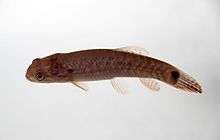Erythrinus erythrinus
| Erythrinus erythrinus | |
|---|---|
 | |
| Scientific classification | |
| Kingdom: | Animalia |
| Phylum: | Chordata |
| Class: | Actinopterygii |
| Order: | Characiformes |
| Family: | Erythrinidae |
| Genus: | Erythrinus |
| Species: | E. erythrinus |
| Binomial name | |
| Erythrinus erythrinus (Bloch & Schneider, 1801) | |
| Synonyms [1] | |
Erythrinus erythrinus, the red wolf fish, is a relatively small species of trahira (family Erythrinidae) from freshwater habitats in South America.[2]
Range and habitat
E. erythrinus is a South American freshwater fish that is native to the Amazon and Orinoco basins, as well as rivers in the Guianas.[2] The species is also reported as native to the Paraná—Paraguay basin, including the Pantanal,[3][4] but the population in the lower Paraná basin and Iguazu basin may be an undescribed species.[5] E. erythrinus has been introduced to the upper Paraná basin where not native.[6] It mainly lives in creeks and marshes where the water has a pH of 5.6–7.8.[2]
Appearance and behavior
E. erythrinus can reach a maximum standard length of 20 cm (7.9 in), although other reports suggest it can reach about 25 cm (10 in).[2]
It feeds primarily on small fish, insects, and benthic crustaceans.[7] Juveniles are aggressive mimics of female aplocheilid killifish, notably Laimosemion agilae, and they use this to catch male killifish that seek a mate.[8]
E. erythrinus is not of major interest to fisheries, but is sometimes used as a bait fish[5] and seen in the aquarium fish trade.[2]
Taxonomy
It was described by Marcus Elieser Bloch and Johann Gottlob Schneider in 1801,[9] originally under the lizardfish genus Synodus. The species was first placed in Erythrinus in 1854 by Gray (under the name Erythrinus salmoneus, a junior synonym of Erythrinus erythrinus), and this treatment has been recognized by recent authorities such as Osvaldo Takeshi Oyakawa in 2003.[10]
References
- ↑ Synonyms of Erythrinus erythrinus at www.fishbase.org.
- 1 2 3 4 5 Erythrinus erythrinus at www.fishbase.org.
- ↑ Britski, de Silimon, and Lopes (2007). Peixes do Pantanal: manual de identificação. Brasília, Embrapa Informação. ISBN 978-85-7383-388-1
- ↑ Martins, Cioffi, Troy, Martinez, Moreira-Filho, and Bertollo (2014). Differentiation and evolutionary relationships in Erythrinus erythrinus (Characiformes, Erythrinidae): occurrence and distribution of B chromosomes. Genetics and Molecular Research 13(3): 7094—7101.
- 1 2 Casciotta, Almirón, Ciotek, Giorgis, Říčan, Piálek, Dragová, Croci, Montes Iwaszkiw, and Puentes (2016). Visibilizando lo invisible. Un relevamiento de la diversidad de peces del Parque Nacional Iguazú, Misiones, Argentina. Historia Natural, Tercera Serie, 6(2): 5—77.
- ↑ Garcia, Hernandes, Silva-Souza, and Orsi (2015). Establishment of non-native predator (Pisces, Erythrinidae) in a tributary of the Upper Paraná River basin, south Brazil. Neotropical Biology and Conservation 10(3): 177-181.
- ↑ Recorded food items for Erythrinus erythrinus at www.fishbase.org.
- ↑ Brosset, A. (1997). Aggressive Mimicry by the Characid Fish Erythrinus erythrinus. Ethology 103(11): 926–934.
- ↑ Bloch, M. E. and J. G. Schneider 1801 [ref. 471] M. E. Blochii, Systema Ichthyologiae iconibus cx illustratum. Post obitum auctoris opus inchoatum absolvit, correxit, interpolavit Jo. Gottlob Schneider, Saxo. Berolini. Sumtibus Auctoris Impressum et Bibliopolio Sanderiano Commissum. M. E. Blochii, Systema Ichthyologiae.: i-lx + 1-584, Pls. 1-110.
- ↑ Oyakawa, O. T. 2003 Erythrinidae (Trahiras). p. 238-240. In R. E. Reis, S. O. Kullander and C. J. Ferraris, Jr. (eds.) Checklist of the Freshwater Fishes of South and Central America. Porto Alegre: EDIPUCRS, Brasil.